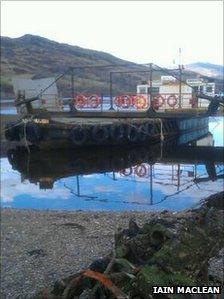Repairs to Strome car ferry Glenachulish after grounding
- Published

The car ferry Glenachulish was damaged on Thursday
A car ferry that had been helping to ease travel in part of the Highlands after a road was shut is to be repaired after running aground.
Witnesses said the engine of the small vessel cut out and it struck rocks near the slipway at North Strome in Wester Ross on Thursday afternoon.
All cars and passengers onboard were able to get off safely after the crew managed to free vessel.
It was introduced after the A890 was shut on 22 December by landslides.
The A890 helps to connect Lochcarron to Plockton, and its high school, and eventually with Kyle, on the opposite site of Loch Carron.
The road runs across the top of the sea loch to link up with the A896, the main road to Lochcarron.
To make the journey by road at the moment involves drivers having to take a 140-mile (225km) diversion, instead of the usual 18 miles (29km) from Lochcarron to Plockton.
Manually operated
The small car ferry has been running between North and South Strome since January.
The 40-year-old craft can take six cars at a time and is the last manually-operated turntable ferry in Scotland.
Highland Council, which hired the community-owned Glenachulish in January, said it expected the vessel to be out of action until after the weekend.
Following Thursday's incident, Highland Council opened the road to temporarily traffic between 07:00-09:00.
Motorists were allowed on the road with an escort provided by the contractor who has been working on making a nearby hillside safe.
From spring to summer the Glenachulish operates out of Glenelg and crosses the Kylerhea straits between the mainland and Skye.
- Published1 March 2012
- Published22 February 2012
- Published14 February 2012
- Published7 February 2012
- Published20 January 2012
- Published16 January 2012
- Published10 January 2012
- Published9 January 2012